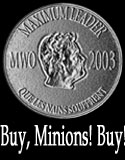Greetings, loyal minions. Your Maximum Leader has been thinking about a comment from a he threw together a short while ago. He feels the need now to restate, that is to say, restate more clearly, the point at which he was driving. He must do so lest you all start to think that your Maximum Leader is going to start making Pat Robertson-esque pronouncements about how God will use the weather to punish the unrighteous.
In this post your Maximum Leader started off by snarkily commenting on the sometimes useless studies presented by news organizations as news. In this case specifically it was a study by the Brookings Institution showing that married couples provide more financial stability, and stability in general, for families than single parents.
Your Maximum Leader stands by his comments that we didn’t need another study to inform us of that which any marginally politically engaged person has known was the case for the past 40 years. But after those comments your Maximum Leader needs to start restating.
As your Maximum Leader has said on many prior occasions, he sometimes posts without proper editorial review of his own work. He posts some rather loosely thought out opinions. In most cases your Maximum Leader has favoured commenting quickly at the expense of editorial clarity.
He did not do himself, or you dear minions, a service by that modus operandi today.
It would seem, upon review, that he implied that the chaos, disorder, lawlessness, and other wretched fates to befall New Orleans after Hurricane Katrina may have been the result of a certain Godlessness exhibited by the residents of New Orleans. A Godlessness not duplicated in Mississippi.
That was not meant to be the thrust of where your Maximum Leader’s comments were going.
A snarky, yet deserved, comment from our own Minister of Propaganda caused your Maximum Leader to re-read his post and think again about what he wrote. Upon review he can see where the idea he wanted to write about became muddled.
The idea that your Maximum Leader wanted to more clearly articulate was not that the Hurricane devastated the non-religious more than the religious; although that interpretation can be easily made from what he wrote. (It is also an interpretation not borne out by any facts.) Moreover, he wanted to point out that the reaction of the population to the privations and destruction that resulted from the Hurricane could, perhaps, be judged by the moral beliefs of those affected by the Hurricane. This is to say that one could use going to church as being an indicator of reaction. The more likely a person was to go to church the less likely they were to become part of a roving mob looting stores, firing guns at the National Guard, and terrorizing their neighbours. It is an imperfect indicator, but your Maximum Leader will maintain a useful one. Church attendance is not the only indicator.
Your Maximum Leader meant to speak much more broadly, and perhaps plainly. He believes that there were many contributing factors to the descent into lawlessness we saw in New Orleans. Let him describe some of them.
The first is basic human nature. When one is no longer constrained by the police powers of “the state” there is a temptation to also throw aside all of the contraints of civil society and act only out of self-interest and self-satisfaction. This is the Hobbesian in your Maximum Leader coming out. He firmly believes that we all have the potential to devolve into brutish thugs acting only to satisfy personal desire. But that potential is held in check by a number of factors. Many of which were absent or degraded in the population of New Orleans.
The second factor is civil society. That is to say those elements of human association outside of the immediate control of “the state.” Civil society, for the purposes of this discussion, is interaction with neighbour�, being part of a community, cooperating with others and interacting with others using unwritten, but learned, guidelines for conversation and behaviour. Broadly speaking being a part of civil society is being what used to be called civilized.
It is somewhat ironic that the word civilized has at its root the word for “city.” In the case of New Orleans after the storm the city was most uncivilized.
Your Maximum Leader stated a moment ago that when one is unconstrained in behaviour by the power of the state that it is often civilized behaviour that constrains his actions. But in New Orleans civilized behaviour was not a constraining factor. Why?
To begin there always has been a hedonistic streak in New Orleans. It wasn’t called “The Big Easy” for nothing. New Orleans was a refreshing change from traditional America in many respects. It was one of those places where you could “let your hair down” and cut loose.
Laissez les bon temps roulez! You always heard that in New Orleans. Let the good time roll! Order that extra appetizer at dinner. Don’t share that sinfully delicious dessert. Have another drink. Visit another strip club. Flash your tits to get some beads. Hook up with a stranger. No one cares if you fall down drunk in the streets. We could all be dead tomorrow. At any moment life as we know it could end.
Contained in those common phrases is a kernel of naive hedonism that should not be overlooked. “Everything we know could be gone tomorrow so live it up today.” New Orleanians prided themselves for living according to that belief. They founded a tourist industry on it.
The problem is that suddenly one tomorrow everything was gone and it was no longer possible to live it up today. Your Maximum Leader believes that a life of living for the bon temps contributed to the fall of civilization in New Orleans. When the party ended no one knew how to react. So many fell back on human nature. A nature that is opposed to constructive, cooperative interaction with others.
Beyond the historic hedonism of the city one cannot overlook poverty. The strain of urban poverty in New Orleans has always been characterised by corruption, crime, and (for the past 40 years) dependency. New Orleans is famous for corruption and petty crime. Your Maximum Leader has seen people shaken down on the streets of New Orleans by the police. (They’ll take $20 from you now to save themselves the effort of doing paperwork for some petty offence.) Your Maximum Leader has seen reports that the overall crime rate in New Orleans is many times higher than the national average. Crime, corruption and hedonism seem to walk hand in hand in New Orleans.
Dependency in New Orleans has taken many forms. Dependency on federal, state, and local welfare and assistance programs. Without those programs functioning you have a substancial population that is angry and filled with a sense of entitlement. Add to anger and entitlement a natural disaster that takes away whatever a person has and threatens their life and the results become Hobbesian.
Where dependency on federal, state, and local assistance programs becomes the norm, traditional support groups (churches and civic associations) suffer. In the case of churches, there is a great societal benefit reaped from church attendance. That benefit is the inculcation of moral values and belief in behavioural absolutes in congregations. A belief in something greater than, and outside of, oneself is a powerful motivator to behave in an acceptable, civilized, way.
And that brings your Maximum Leader back to where he started… In areas outside of New Orleans, areas that didn’t have the same culture as New Orleans you didn’t have the same reaction among the populace to the destruction wrought by Katrina. The traditional bonds of civilization held in places like Biloxi, Waveland, and Pascagoula. There is, your Maximum Leader thinks, something to be said about that.
Carry on.


